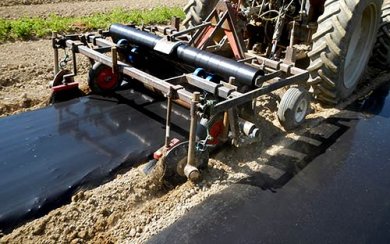Short Summary
This French-speaking hub develops replicable, open source convivial tools, ecologically sound farm buildings and machinery for small-scale farming and organic agriculture. It combines collective farmer-led design, on-farm innovation and engineering expertise.At Atelier Paysan, engineers and equipment are available to help farmers design, test and distribute tools and machines, which are locally reproducible and adaptable to local circumstances (machines are adapted to the soil and the fields, as opposed to the reverse).

Logo.
source ![]()
Website: latelierpaysan.org
Location: Rhône-Alpes region (primarily) & Brittany region (additional branch), France
Profile
Atelier Paysan aims to collaboratively develop methods to reclaim farming skills and to achieve self-sufficiency with regard to (1) agricultural tools and (2) machinery used for organic farming.
"We want to develop agricultural machinery which supports small scale organic farming, and which can be appropriated and modified by farmers." (source)They describe their goal as "technological sovereignty" for small-scale farmers, which is key to reclaiming ownership of small farms' system-wide design.
Atelier Paysan provides advice and guidance for small-scale farmers on agricultural tools tailored to their needs. It accompanies farmers through their trials and tribulations in their farming journey, individually or collectively, whatever their area of production.
Atelier Paysan was created in 2011 by small-scale farmers, engineers, employees and agricultural development organizations.
"Atelier Paysan has emerged from a movement which promotes an alternative vision to the modernisation of agriculture and the development of rural areas carried out since the Second World War." (source)As of 2015, the cooperative was made up of 50 members (employees, farmers and agricultural development partners).

The plastic rolling machine developed in 2014. This type of tool has been tested and researched on farms within the Atelier Paysan network through a participatory and collective design process.
source ![]()
Peer Governance
In 2013, Atelier Paysan transitioned to a cooperative model to increase their access to loans from banks and social investment networks and to professionalize their management."We believe that agronomic practices need to be elaborated with, by, and for farmers." (source)Atelier Paysan is not a service provider, but uses a needs-based approach. It is more like a steward, coordinator and caretaker for regular contact with local networks of farmers. Their work begins when a well-defined group of farmers ask for their support and guidance. If this support request is accepted, Atelier Paysan begins to promote the creation of working groups. Members of these groups should ideally live near one another, as they will need to meet regularly to collaboratively design, build and test tools.
Atelier Paysan staff writes up a set of specifications with the group, so that each step and the tools developed are in line with farmers' needs. The group puts forward an initial design, followed by a series of feedback sessions and modifications. Prototype testing takes place on participating farms in the presence of the whole group. If a consensus is reached, the design is published and may be used by others.
"Matthieu Dunand, a market gardener in the Haute-Savoie (from the GAEC La Pensée Sauvage), shares his experience: 'At first, I couldn’t imagine making my own tools. Today on the farm, our perspective has really changed: in the past we felt we had no choice but to work with the machinery available on the market, but we’re now continually working towards more ergonomic systems, better cultivation practices, and using less petrol. We have unleashed the engineers within us!'" (source)
Friends & Partners
- FNAB network (National Federation of Organic Farming)
- FNCIVAM network (National Federation of Initiatives to Promote Agriculture and Rural areas)
- The FADEAR network (Federation of Organisations promoting the Development of Agricultural and Rural Livelihoods)
- RENETA network (National Networks of Agricultural Test Spaces)
- Listing of other partners
Finances
While most agricultural development organizations are publicly funded, Atelier Paysan aspires to be primarily self-financed. Their 2014-2015 budget aimed for 60% self-financing and no more than 40% public financing.Participatory funding makes up a significant portion of their self-funding. This means that its users, e.g. training course participants, contribute to AP's income by paying fees.
See Also
- Farm Hack, an US-based organization with similar goals